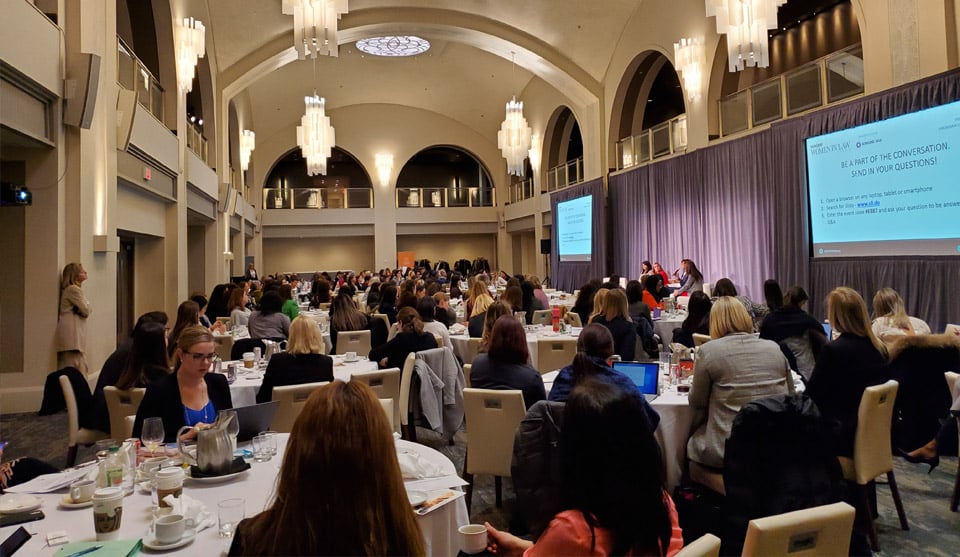Topics like gender parity are not just 'women's issues,' panellists say

While books like “Lean In” have focused on a woman’s role in the workplace, more attention is needed on a workplace’s role in women’s lives, said panellists at Canadian Lawyer’s Women in Law Summit in Toronto on Feb. 12.
“The business model that we work under was designed for men, by men. And unfortunately it was designed for straight white men who have a wife at home who does everything, so a man can focus on his career,” said Dale Osadchuk, a partner at Davies Ward Phillips and Vineberg LLP. “I always hear, ‘Well, I’m the exception’ . . . . all the big firms began putting in place policies that they didn’t understand, so it almost became window-dressing — the perception of men being, ‘Well, now we’ve dealt with this.’”
A selective, “white-washed” history of women in the workplace — focused on those who are privileged enough to have a spouse stay home and raise children — has fed into the structure of law firms today, said Genevieve Boulay, counsel with Westaway Law Group.
“The panellists this morning have talked about it, and we’ve heard all of this before: The way that we have relationships at home needs to change, and our division of labour at home,” she said at the event, marker in hand as she collected suggestions from the audience.
“Firm management could take important steps to be great role models. The legal profession has some issues: We need to redefine success. We've inherited the certain socioeconomic, cultural context and that's just kind of where we find ourselves, and maybe that needs to change, too. …. The onus of making these changes is not just on any one of these levels, and it's definitely not the level of the individual.”
For example, Nikki Gershbain, chief inclusion officer at McCarthy Tétrault LLP, noted that many firms overlook efforts that might have the most impact. By prioritizing recruitment over retention — or by hosting discussions about diversity that don’t touch words like ‘racism’ or ‘transphobia — inclusion policies can be reduced to marketing campaigns, she said. While the “numbers game” of hiring was a trend for a while, it doesn’t work if people don’t get the opportunities they were promised when they are hired, she said, recalling her experience as the only queer person in a workplace, and how lonely she felt.
“Some organizations make the mistake of locating all of these policies and programs in HR or PR,” said Gershbain. “What that doesn't take into account is the fact that diversity is a business driver and it is a leadership issue.”
Several panellists spoke to the importance of organizations collecting data beyond high-level demographics, such as how many people attend diversity events, whether performance reviews are having differential impacts, and whether men are taking advantage of parental leave policies.
At the individual level, people may bristle at the idea of systemic sexism, especially when their intentions are positive: Rebecca Bromwich, manager of diversity and inclusion at Gowling WLG, gave the example of a performance review calling a woman a “sweetheart.” While the sentiment may be harmless, it reflected the less-than-transparent performance metrics used by firms, which could allow unconscious biases to slip in. Those biases, panellists said, are held widely by men and women alike and must be overridden by conscious action. For example, the firm rejigged its partnership nominations to use specific forms, rather than reference letters
“There's all kinds of principles and declarations, and I think they are good things, right? But there is something called virtue signaling,” Bromwich said. “We have our critical lens on the idea of signing on to declarations that can be somewhat empty.”
Gershbain noted that, as the joke goes, workers are interested in what their boss is interested in. So, she says, bosses need to show they are really watching how their employees address diversity.
“I think it's time for the leaders, and the allies and the men to lean in, and to buy in, and to get off their rear end and take some action,” said Rose Leto, a partner at Neinstein Personal Injury Lawyers. “And, you know, it's all nice to talk about what we can do, but they actually need to do it.”










